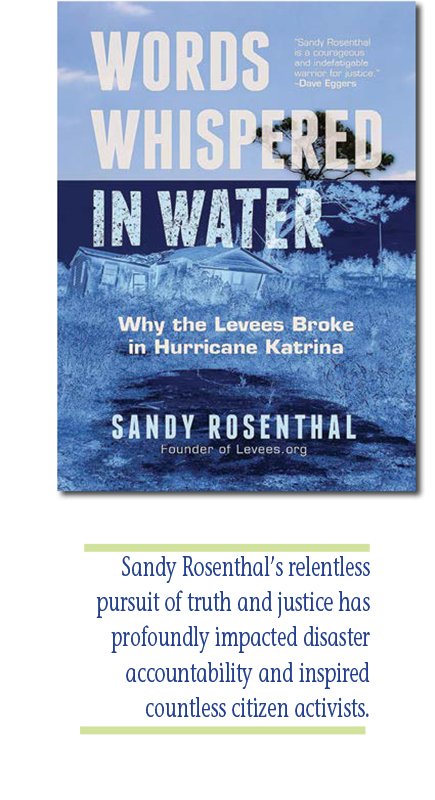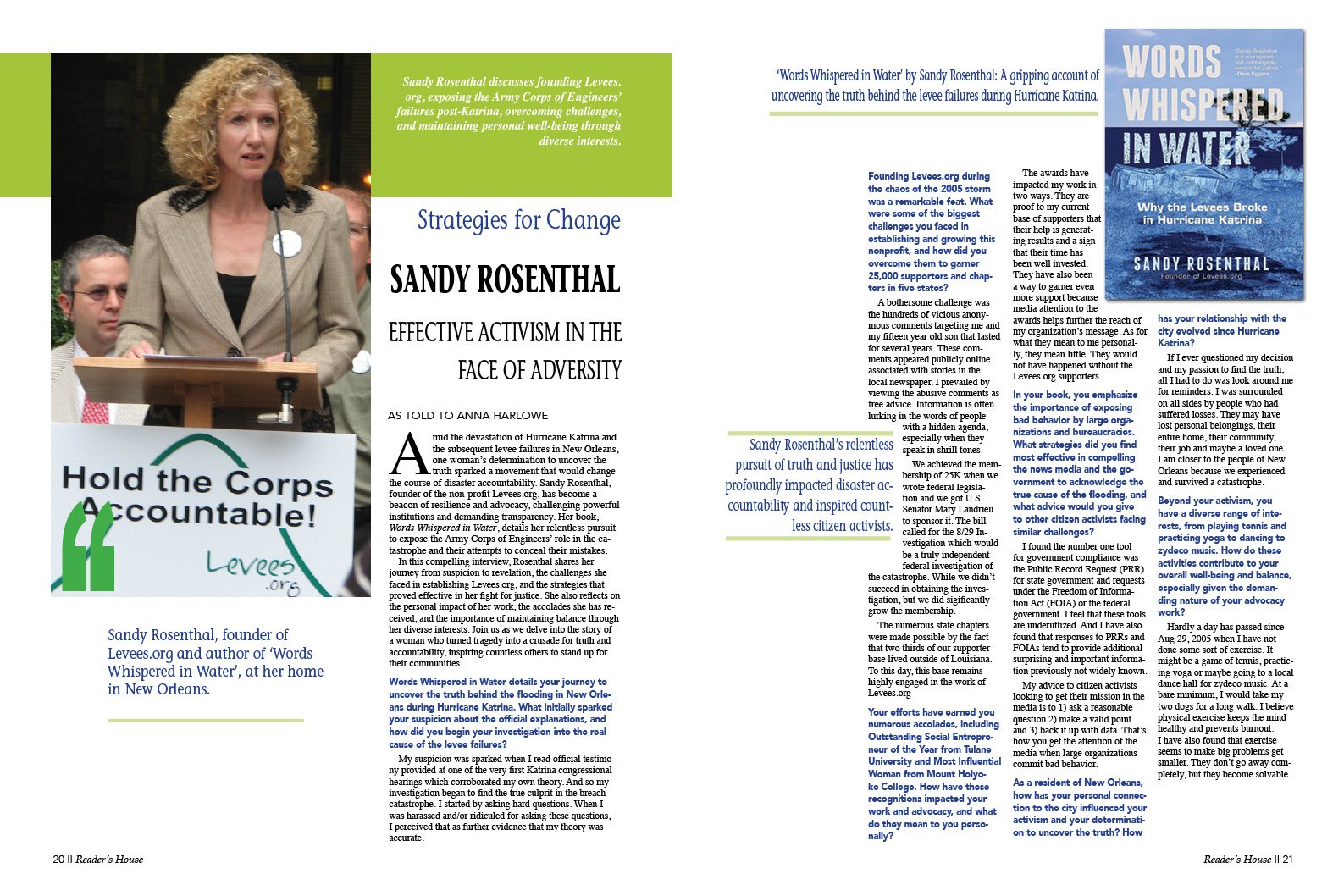Effective Activism in the Face of Adversity
Sandy Rosenthal discusses founding Levees.org, exposing the Army Corps of Engineers’ failures post-Katrina, overcoming challenges, and maintaining personal well-being through diverse interests.
Amid the devastation of Hurricane Katrina and the subsequent levee failures in New Orleans, one woman’s determination to uncover the truth sparked a movement that would change the course of disaster accountability. Sandy Rosenthal, founder of the non-profit Levees.org, has become a beacon of resilience and advocacy, challenging powerful institutions and demanding transparency. Her book, Words Whispered in Water, details her relentless pursuit to expose the Army Corps of Engineers’ role in the catastrophe and their attempts to conceal their mistakes.
In this compelling interview, Rosenthal shares her journey from suspicion to revelation, the challenges she faced in establishing Levees.org, and the strategies that proved effective in her fight for justice. She also reflects on the personal impact of her work, the accolades she has received, and the importance of maintaining balance through her diverse interests. Join us as we delve into the story of a woman who turned tragedy into a crusade for truth and accountability, inspiring countless others to stand up for their communities.
Words Whispered in Water details your journey to uncover the truth behind the flooding in New Orleans during Hurricane Katrina. What initially sparked your suspicion about the official explanations, and how did you begin your investigation into the real cause of the levee failures?

My suspicion was sparked when I read official testimony provided at one of the very first Katrina congressional hearings which corroborated my own theory. And so my investigation began to find the true culprit in the breach catastrophe. I started by asking hard questions. When I was harassed and/or ridiculed for asking these questions, I perceived that as further evidence that my theory was accurate.
Founding Levees.org during the chaos of the 2005 storm was a remarkable feat. What were some of the biggest challenges you faced in establishing and growing this nonprofit, and how did you overcome them to garner 25,000 supporters and chapters in five states?
A bothersome challenge was the hundreds of vicious anonymous comments targeting me and my fifteen year old son that lasted for several years. These comments appeared publicly online associated with stories in the local newspaper. I prevailed by viewing the abusive comments as free advice. Information is often lurking in the words of people with a hidden agenda, especially when they speak in shrill tones.
We achieved the membership of 25K when we wrote federal legislation and we got U.S. Senator Mary Landrieu to sponsor it. The bill called for the 8/29 Investigation which would be a truly independent federal investigation of the catastrophe. While we didn’t succeed in obtaining the investigation, but we did sigificantly grow the membership.
The numerous state chapters were made possible by the fact that two thirds of our supporter base lived outside of Louisiana. To this day, this base remains highly engaged in the work of Levees.org
Your efforts have earned you numerous accolades, including Outstanding Social Entrepreneur of the Year from Tulane University and Most Influential Woman from Mount Holyoke College. How have these recognitions impacted your work and advocacy, and what do they mean to you personally?
The awards have impacted my work in two ways. They are proof to my current base of supporters that their help is generating results and a sign that their time has been well invested. They have also been a way to garner even more support because media attention to the awards helps further the reach of my organization’s message. As for what they mean to me personally, they mean little. They would not have happened without the Levees.org supporters.
In your book, you emphasize the importance of exposing bad behavior by large organizations and bureaucracies. What strategies did you find most effective in compelling the news media and the government to acknowledge the true cause of the flooding, and what advice would you give to other citizen activists facing similar challenges?
I found the number one tool for government compliance was the Public Record Request (PRR) for state government and requests under the Freedom of Information Act (FOIA) or the federal government. I feel that these tools are underutlized. And I have also found that responses to PRRs and FOIAs tend to provide additional surprising and important information previously not widely known.
My advice to citizen activists looking to get their mission in the media is to 1) ask a reasonable question 2) make a valid point and 3) back it up with data. That’s how you get the attention of the media when large organizations commit bad behavior.
As a resident of New Orleans, how has your personal connection to the city influenced your activism and your determination to uncover the truth? How has your relationship with the city evolved since Hurricane Katrina?
If I ever questioned my decision and my passion to find the truth, all I had to do was look around me for reminders. I was surrounded on all sides by people who had suffered losses. They may have lost personal belongings, their entire home, their community, their job and maybe a loved one. I am closer to the people of New Orleans because we experienced and survived a catastrophe.
Beyond your activism, you have a diverse range of interests, from playing tennis and practicing yoga to dancing to zydeco music. How do these activities contribute to your overall well-being and balance, especially given the demanding nature of your advocacy work?
Hardly a day has passed since Aug 29, 2005 when I have not done some sort of exercise. It might be a game of tennis, practicing yoga or maybe going to a local dance hall for zydeco music. At a bare minimum, I would take my two dogs for a long walk. I believe physical exercise keeps the mind healthy and prevents burnout. I have also found that exercise seems to make big problems get smaller. They don’t go away completely, but they become solvable.



